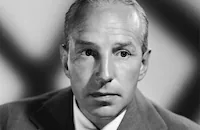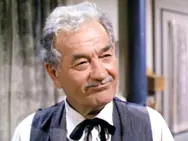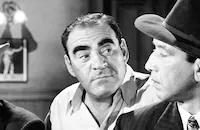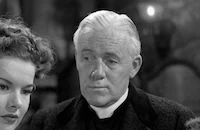Johnny Apollo

Brief Synopsis
Cast & Crew
Henry Hathaway
Tyrone Power
Dorothy Lamour
Edward Arnold
Lloyd Nolan
Lionel Atwill
Photos & Videos
Film Details
Technical Specs

Synopsis
After his father, a multimillion-dollar stockbroker, is indicted for embezzlement and sentenced to prison, Bob Cain Jr., feels betrayed and condemns the old man. He then quits college and begins to search for a job. Because of his father's notoriety, however, Bob is denied job after job and is still unemployed one year later. When Mickey Dwyer, a notorious gangster who was sentenced on the same day as his father, is paroled from prison, Bob decides to visit Dwyer's lawyer, Judge Emmett T. Brennan, to see if he can win a parole for his father. While waiting for the attorney, Bob meets "Lucky" Dubarry, Dwyer's girl friend. After Brennan informs Bob that only money can win a parole, Bob assumes the name of Johnny Apollo and joins Dwyer's gang in order to raise enough money to get his father out of jail. Upon learning that his son has become Dwyer's henchman, "Pop" Cain, one of the most beloved inmates in the prison, disowns Bob. Soon after, a reform administration determined to crack down on crime comes into office, and Lucky, who has fallen in love with Bob, convinces Brennan to make a deal with the district attorney: Bob's freedom in return for Dwyer's conviction. Learning of the double-cross, Dwyer murders Brennan, and both he and Bob are sent to jail. After overhearing plans for an escape, Lucky tips Pop to the break and the old man arrives just in time to prevent his son from joining Dwyer. In the ensuing struggle, Dwyer shoots Pop and knocks Bob unconscious, making it look as if Bob shot the old man. Dwyer dies in the escape, and as Pop lies in critical condition from his wounds, there is talk of sending Bob to the chair. Pop regains consciousness, however, and reconciles with his son. After both men are paroled, father and son start a new life as free men, and Lucky and Bob are united.

Director

Henry Hathaway
Cast

Tyrone Power

Dorothy Lamour

Edward Arnold

Lloyd Nolan

Lionel Atwill
Marc Lawrence

Jonathan Hale
Harry Rosenthal

Russell Hicks

Fuzzy Knight

Charles Lane
Selmar Jackson
Charles Trowbridge

John Hamilton
William Pawley
Eric Wilton
Gary Breckner
Harry Tyler

George Irving
Eddie Marr

Anthony Caruso
Stanley Andrews
Wally Albright
Charles Williams

Bess Flowers
Ed Stanley

Milburn Stone
Phil Tead
Charles Tannen
Tom Dugan
Joe Caits
Gladden James
Norman Willis
Philip Morris
Jim Pierce
Robert Homans

Ralph Dunn

James Flavin
Stanley Blystone

Louis Jean Heydt
William Haade

Walter Miller
James Blaine
Don Rowan
Dick Rich
Edward Mundy
Jack Smart
Lee Shumway

Emmett Vogan

Charles D. Brown
Ed Gargan
Robert Shaw
Crew
Robert Bischoff
Harry Joe Brown
Rowland Brown
Richard Day
Philip Dunne
Samuel G. Engel
Mack Gordon
Roger Heman
Wiard B. Ihnen
Curtis Kenyon
Thomas Little
Frank Loesser
Hal Long
Arthur Miller
Cyril J. Mockridge
Lionel Newman
Ad Schaumer
Gwen Wakeling
E. Clayton Ward
Darryl F. Zanuck

Photo Collections
Film Details
Technical Specs

Articles
Johnny Apollo
But he was not often recognized as a classically trained stage actor - the Power family trade since the mid-19th century. On stage he worked with the likes of Katharine Cornell, Charles Laughton, Orson Welles, Judith Anderson and Raymond Massey. He was related to Laurence Olivier and Tyrone Guthrie. Each time he donned a scabbard and doublet for the cameras, it rankled him that such typecasting, however lucrative, narrowed his range. Armed with clout, he pressured Zanuck to cast him as a carnival sideshow geek in the cult fave, Nightmare Alley (1947). His last completed film role, as the accused murderer in Billy Wilder's Witness for the Prosecution (1957) was one of his best.
Which brings us to Johnny Apollo (1940). One can't keep from speculating that in retrospect Power must have enjoyed it, if only because he gets his face punched in a few times. We first see him as the Ivy League scion of a rich widower stockbroker from Gatsby country - mansion, butler, formal wear at dinner even if he's dining home alone. Then just after rowing his heart out for Harvard, Yale, Princeton or whatever, he gets the grim news that his father has been arrested for fiddling with his customers' accounts, is ruined and is staring a prison term in the face. At this point, Power's Bob Cain seems not just unworldly, but spoiled and self-righteous, dropping out of college in shame and denouncing his old man. The formidable Edward Arnold, as the guilty paterfamilias, bears up with a stoic dignity that outclasses his son, and trudges off to prison, but not before telling his son that it's an eat-or-be-eaten world and codes are for suckers.
By the merest of coincidences, this is the same world view of Lloyd Nolan's racketeer, who hires Bob after the Cains' hoity-toity circle drops them. Because the name of Cain has become social poison, Bob looks out a window and calls himself Johnny Apollo after the dance hall across the street. Not only that. He also gets Dorothy Lamour, the racketeer's nightclub singer mistress who owns the mink on her back and little else. She's OK as the coarse dame with heart. Lamour, of sarong and WW II pin-up fame, armed with half-lidded eyes and pouty lips, does not experience her finest hour here, given cliché after cliché to play and being lumbered with a couple of altogether forgettable songs. They meet on the staircase outside the office of the racketeer's alcoholic, Shakespeare-quoting lawyer, played by that silver-haired figure of sweet frailty, Charley Grapewin, best remembered as Dorothy's Uncle Henry in The Wizard of Oz (1939) and Grandpa Joad in The Grapes of Wrath (1940).
But even Grapewin's sweetness disappears entirely when Bob/Johnny experiences a change of heart about his imprisoned father. When he asks the lawyer about a parole, the old jurist growls, "Money!" The Depression-Era toughness that matter-of-factly pervades so many '30s films is the power source of Johnny Apollo, the reason veteran director Henry Hathaway is able to pace it so efficiently through its set pieces. As Power's Bob/Johnny wises up by learning things you don't learn in college, it's a tribute to his abilities that he's able to move the title-roleist from twerp to tolerable, then likable.
For a while, he's frankly the least appealing figure on screen, especially positioned as he is between the commanding baritone pillars of Arnold and Nolan. If the son rethinks his position and becomes more compassionate, Arnold's father seems to mellow and deepen, too, shored up by an inner toughness that enabled the stockbroker to rise in the world in the first place. We're not surprised when he chooses boilermaker as his prison job, saying it was his first adult job, and knowledgably taking right up where he presumably left off. When his son's misdeeds catch up with him, he winds up in the same prison as his old man. When there's a rumor of a jailbreak, it's not the rocklike father's safety you worry about, but junior's.
Nolan, whose popularity was to soar in WW II movies, makes the racketeer surprisingly likable, too, at least until he starts slapping Lamour around. It's no backhanded compliment to say that while it takes Power half the film to match the simpatico vibes of the older men, he does. Nolan and Arnold are two more reminders of Hollywood's golden age of character actors. Johnny Apollo isn't one of the iconic gangster movies. But it's a solidly crafted effort that delivers honest entertainment value and likely left its audiences feeling they had got their two bits' worth. MGM studio boss Louis B. Mayer was fond of boasting that his studio had "more stars than there are in the heavens." Power, Nolan and Arnold provide ample evidence that Fox under Zanuck was no pocket of poverty in the acting department, either.
By Jay Carr

Johnny Apollo
Marc Lawrence (1910-2005)
Born Max Goldsmith on February 17, 1910, in the Bronx, Lawrence had his heart set on a career in drama right out of high school. He enrolled at City College of New York to study theatre, and in 1930, he worked under famed stage actress Eva Le Gallienne. Anxious for a career in movies, Lawrence moved to Hollywood in 1932 and found work immediately as a contract player with Warner Bros. (an ideal studio for the actor since they specialized in crime dramas). He was cast as a heavy in his first film, If I Had a Million (1932). Although his first few parts were uncredited, Lawrence's roles grew more prominent: a sinister henchman in the Paul Muni vehicle in Dr. Socrates (1935); a conniving convict aiding Pat O'Brien in San Quentin (1937); a menacing thug stalking Dorothy Lamour in Johnny Apollo (1940); the shrewdly observant chauffeur in Alan Ladd's breakthrough hit This Gun For Hire (1942); and one of his most memorable roles as Ziggy, a fedora wearing mobster in the Bogart-Bacall noir classic Key Largo (1948).
Lawrence, when given the opportunity, could play against type: as the prosecuting attorney challenging Tyrone Power in Brigham Young (1940); a noble aristocrat in the Greer Garson-Walter Pidgeon period opus Blossoms in the Dust; and most impressively, as a deaf mute simpleton in the rustic drama The Shepherd of the Hills (both 1941). Better still was Lawrence's skill at comedy, where his deadpan toughness worked terrifically as a straight man against the likes of Joe E. Brown in Beware Spooks (1939); Abbott and Costello in Hit the Ice (1943); Penny Singleton in Life with Blondie (1945); and Bob Hope in My Favorite Spy (1951).
After that, Lawrence's career took a turn downward spin when he was labeled a communist sympathizer during the Hollywood witch hunts of the early '50s. He was exiled in Europe for a spell (1951-59), and when he came back, the film industry turned a blind eye to him, but television overcompensated for that. Here he played effective villains (what else?) in a series of crime caper programs: Peter Gunn, Johnny Staccato, The Untouchables, Richard Diamond, Private Detective; and eventually made a welcome return to the big screen as a returning exiled gangster in William Asher's underrated mob thriller Johnny Cool (1963).
It wasn't long before Lawrence found himself back in the fray playing in some big box-office hits over the next two decades: Diamonds Are Forever (1971), The Man with the Golden Gun (1974), Marathon Man (1976), Foul Play (1978); and The Big Easy (1987). Sure he was cast as a gangster, but nobody could play a rough and tumble mob boss with more style or conviction.
Interestingly, one of his finest performances in recent years was in television, as a severely ill old man unwilling to accept his fate in a fourth season episode of ER (1997-98). His last screen role was just two years ago, as a nimble minded VP in Looney Tunes: Back in Action (2003).
In 1991, Lawrence published a memoir about his venerable career, Long Time No See: Confessions of a Hollywood Gangster that received much critical acclaim. He has also developed a cult following due to his appearances in such offbeat items as From Dusk to Dawn and Pigs aka Daddy's Deadly Darling, the 1972 horror film he directed and starred in with his daughter Toni. He is survived by his wife, Alicia; two children from a previous marriage, Toni and Michael; and a stepdaughter Marina.
by Michael T. Toole
Marc Lawrence (1910-2005)
Quotes
Trivia
Notes
The working title of this film was Dance with the Devil. According to a pre-production news item in Hollywood Reporter, Fox considered borrowing George Raft from Warners to appear in this film. According to the Twentieth Century-Fox Produced Scripts Collection at the UCLA Theater Arts Library, Darryl Zanuck directed that the father-son slant of the story be developed more and suggested Moroni Olsen for the role of McLaughlin and Ernest Truex for that of Brennan. In 1941, Burgess Meredith, Edward Arnold and Dorothy Lamour starred in a Lux Radio Theater version of this story.














